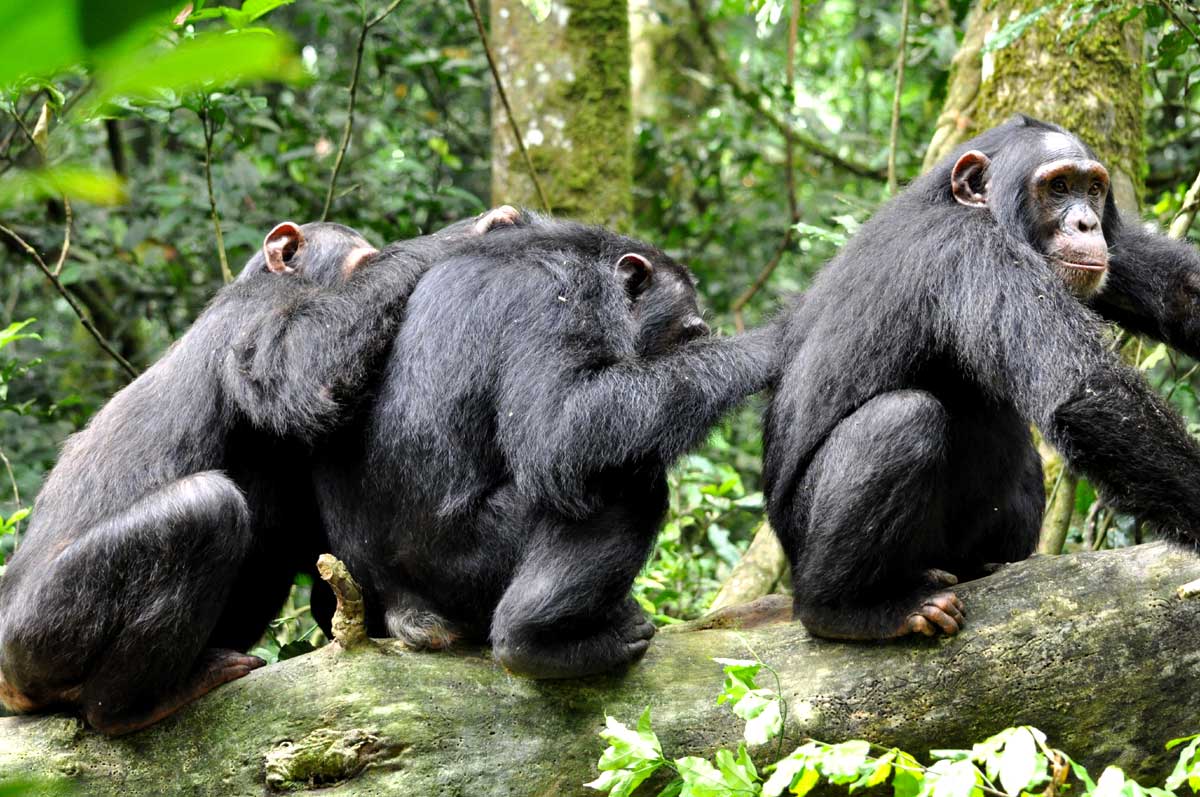As Dr. Jane Goodall, DBE Founder, the Jane Goodall Institute & UN Messenger of Peace once said:
“The more I came to learn about chimpanzees the more I came to realize how like us they are… Finally we realize we are a part of the animal kingdom not separate from it.”
Did you know that World Chimpanzee Day is celebrated every year on 14 July?
Chimpanzees are highly intelligent, capable of communication, problem solving and even empathy. Research has shown they live in complex social structures, not unlike those we humans do.

Facts about Chimpanzees
We share between 92 and 98% of our DNA with chimpanzees who are often referred to as our closest primate cousins. Our two species descended from a single species that lived millions of years ago. Here are some interesting facts about chimpanzees…
1. Very Important Ecological Role
Chimpanzees along with the other great apes and elephants play a crucial role in the maintenance of biodiversity in Central Africa’s forests. The large seeds they eat and disperse are too big for most other animals. Without them, and their fellow great apes and elephants, these forests would be irreversibly changed.
2. Only in Africa
The largest concentration of Chimpanzees are mostly in rainforest areas in central Africa. These areas have the water supply that is needed to ensure the abundance of the fruits they eat. However many of these regions are being encroached on by human settlements or destroyed due to mining or commercial farming efforts. While there are many chimpanzees living in captivity, wild chimpanzees are only to be found in Africa.
3. Not a Bonobo
The chimpanzee’s closest ape relative is the bonobo which has often been called the pygmy chimpanzee.
However bonobos are entirely different animals even though they are the only species other than chimpanzees in the genus Pan, a sister taxon to the human lineage.
An interesting fact about bonobos is that they can help to distinguish them from a chimpanzee, is that they are far less afraid of water than chimps and often will fish for shrimp by hand.
4. Chimps are Omnivores, Just Like Us!
Chimpanzees enjoy a diverse menu that includes both plants and animals. Fruits, nuts, leaves, and even fungi are all fair game. They’ll readily devour flowers, insects, and even small meat sources. Chimpanzees are resourceful eaters, too. Some fruits are transformed into handy “wadges” by chewing them into a ball. It is then dipped in water to get to the delicious juices. However, their diet isn’t limited to what they can find with their bare hands.
5. They Make and Use Tools
Chimpanzees are known for their impressive tool use. Cracking tough nuts becomes a breeze with a stone acting as a hammer and a branch as an anvil.
The nut is placed on a sturdy surface like a tree root, then smashed open with their makeshift tools.
Their ingenuity extends to insect hunting as well. Chimps can modify sticks to the perfect length, creating an “ant rod” that they dip into ant nests. The ants climb up the stick, becoming a tasty snack for the clever chimp.

World Chimpanzee Day
Every year, in an attempt to honour human’s closest cousin in the animal kingdom, we celebrate World Chimpanzee Day on July 14. The date is the day when, in 1960 Dr Jane Goodall, first arrived in what is today known as Gombe Stream National Park to begin her study of wild chimpanzees. Goodall, along with dedicated researchers who followed her path revolutionised our understanding of chimpanzees.
World Chimpanzee Day isn’t just about celebrating these fascinating creatures, it’s also a crucial reminder of the challenges they face. The International Union for Conservation of Nature (IUCN) classifies all four chimpanzee subspecies as endangered. Deforestation, poaching for the pet trade, and infectious diseases are the biggest threats identified by the IUCN.
The Wildlife Conservation Society (WCS) has cited the Chimpanzee’s slow rate of reproduction as a factor in their declining numbers. It takes 14-15 years to replace a killed adult as a breeding individual. Chimpanzees are also being exposed to over 140 human diseases.
What can you do?
You too can help chimpanzees on World Chimpanzee Day and any other day of the year. Here are some things you could do:
• Share information about chimpanzees to highlight World Chimpanzee Day on social media using the hashtag #WorldChimpanzeeDay
• Host an event as an opportunity for your friends to learn more about chimpanzees. Ask them to share about it on their own social media platforms
• Adopt positive consumer behaviour such as cell phone recycling and avoiding products made with unsustainable palm oil can help chimpanzees



